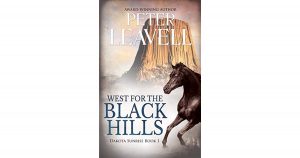by Peter Leavell, @PeterLeavell

I write historical fiction. The research I do for each novel creates a pile of books taller than I am, and the stack is high enough that lives are in danger from its avalanche. I read the scholarly work, take notes, and then place characters in the period. In other words, I use real history to torture imaginary characters.
Sure, readers and academics like the history in my books, and sure, I’ve a degree in history. I even teach history. Here’s a little secret.
I don’t care for history as a subject.
I’m taking classes for a MA in History, and I slog through them. I don’t really understand why I don’t like them, because I breezed through my MA in Literature, where I read over 1,500 pages a week. I even had to read Freud. But with history, I feel… meh.

What gives? How can I get through the pile of historical malaise so I can get to the fun of plotting pain for my characters?
I decided to focus on what really matters to me. People. I’m a writer, so I’m naturally interested in the train wreck called normal human life. I’m also interested in how and why love flourishes despite the constant battering of events around a couple, called a realistic relationship. I keep those two interests in mind as I research, imagining what life was like in the past.
When I read boring, academic books and primary sources, I use my interest to make the books intriguing. I’m not simply letting the book speak to me. Rather, I mine the material for information and picture my character struggling through what I’m reading. That way, I turn the pages eagerly, wondering what historical event will happen next to challenge my characters.
Don’t let boring history books slow you down. Try imagining characters first, and then reading history books. You may find the tomes more interesting.
Philip Anderson keeps his past close to the vest. Haunted by the murder of his parents as they traveled West in their covered wagon, his many unanswered questions about that night still torment him.
His only desire is to live quietly on his homestead and raise horses. He meets Anna, a beautiful young woman with secrets of her own. Falling in love was not part of his plan. Can Philip tell her how he feels before it’s too late?
With Anna a pawn in the corrupt schemes brewing in the nearby Dakota town, Philip is forced to become a reluctant gunslinger. Will Philip’s uncannily trained horses and unsurpassed sharpshooting skills help him free Anna and find out what really happened to his family in the wilderness?

Peter Leavell, a 2007/2020 graduate of Boise State University with a degree in history and a MA in English Literature, was the 2011 winner of Christian Writers Guild’s Operation First Novel contest, and 2013 Christian Retailing’s Best award for First-Time Author, along with multiple other awards. An author, blogger, teacher, ghostwriter, jogger, biker, husband and father, Peter and his family live in Boise, Idaho. Learn more about Peter’s books, research, and family adventures at www.peterleavell.com


Comments 1
I totally agree, Peter. I was never much for history before I began writing historical fiction. But once I’m invested in a character and I need to figure out how to get them from Point A to B or what they ate for breakfast or how they cooked it or what’s in the headlines of their morning paper, well … it all suddenly becomes a lot more fascinating. “Hey, I can use that!” is one of my favorite experiences.